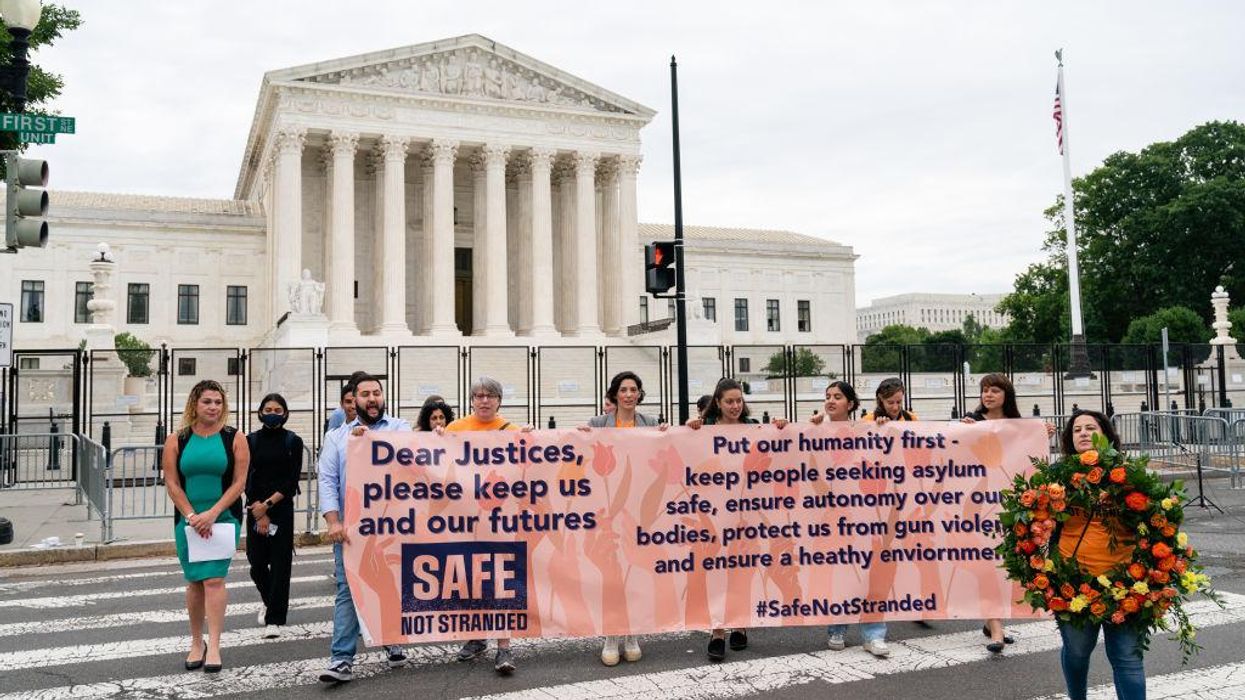
Eric Lee/Bloomberg via Getty Images

President Joe Biden won a victory at the U.S. Supreme Court on Thursday after the court said he may repeal the Trump administration's "Remain in Mexico" immigration policy.
Under former President Donald Trump, the Department of Homeland Security required migrants seeking asylum in the U.S. to wait in Mexico for their immigration hearings. This policy, known as Migrant Protection Protocols, was meant to address the widespread problem of migrants coming to the U.S. and disappearing within the country when they are supposed to show up in court. About 70,000 migrants were made to wait in Mexico under the Trump administration.
Immigration activists opposed the "Remain in Mexico" policy, accusing it of being inhumane, and Biden sought to repeal it last year as part of his larger effort to reverse his predecessor's immigration policies. But a lower court blocked the administration from doing so.
The question before the Supreme Court was whether repealing the policy would violate federal law that requires migrants to be detained for immigration proceedings and, if that migrant arrives on land from a contiguous territory, gives immigration enforcement the option of removing those migrants.
The relevant statute says that any person applying for admission to the U.S. "shall be detained for a proceeding" unless they are "clearly and beyond a doubt entitled to be admitted." If the migrant came to the U.S. by land from a contiguous territory (Mexico or Canada), then "the Attorney General may return the alien to that territory" while they await their proceeding.
In a 5-4 decision, the court held that repealing Trump's Migrant Protection Protocols did not violate the law.
"If Congress had intended section 1225(b)(2)(C) to operate as a mandatory cure of any noncompliance with the Government's detention obligations, it would not have conveyed that intention through an unspoken inference in conflict with the unambiguous, express term 'may.' It would surely instead have coupled that grant of discretion with some indication of its sometimes-mandatory nature — perhaps by providing that the Secretary 'may return' certain aliens to Mexico, 'unless the government fails to comply with its detention obligations, in which case the Secretary must return them,'" Chief Justice John Roberts wrote for the majority.
"The statutory grant of discretion here contains no such caveat, and we will not rewrite it to include one," Roberts declared.
Roberts was joined by Justices Stephen Breyer, Elena Kagan, Brett Kavanaugh, and Sonia Sotomayor.
Justice Samuel Alito dissented and was joined by Justices Clarence Thomas and Neil Gorsuch. He argued that the government does not have the authority to release migrants into the U.S. if it appears that they are not admissible under the law.
"In fiscal year 2021, the Border Patrol reported more than 1.7 million encounters with aliens along the Mexican border. When it appears that one of these aliens is not admissible, may the Government simply release the alien in this country and hope that the alien will show up for the hearing at which his or her entitlement to remain will be decided?" Alito wrote.
"Congress has provided a clear answer to that question, and the answer is no," he asserted, citing federal law that says an alien "shall be detained" for deportation if they have no legal right to enter the U.S.
Pointing out that the DHS "does not have the capacity to detain all inadmissible aliens encountered at the border," Alito said that the Biden administration's decision to release migrants into the U.S. ignores the solution federal law provides of having those migrants remain in Mexico.
"Rather than avail itself of Congress’s clear statutory alternative to return inadmissible aliens to Mexico while they await proceedings in this country, DHS has concluded that it may forgo that option altogether and instead simply release into this country untold numbers of aliens who are very likely to be removed if they show up for their removal hearings," Alito wrote.
"This practice violates the clear terms of the law, but the Court looks the other way," he said.